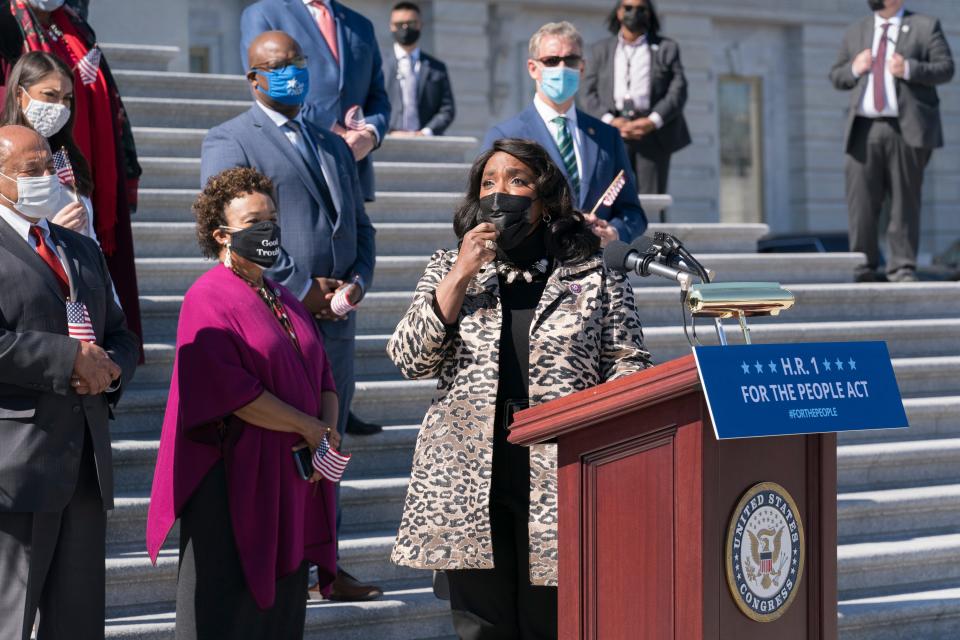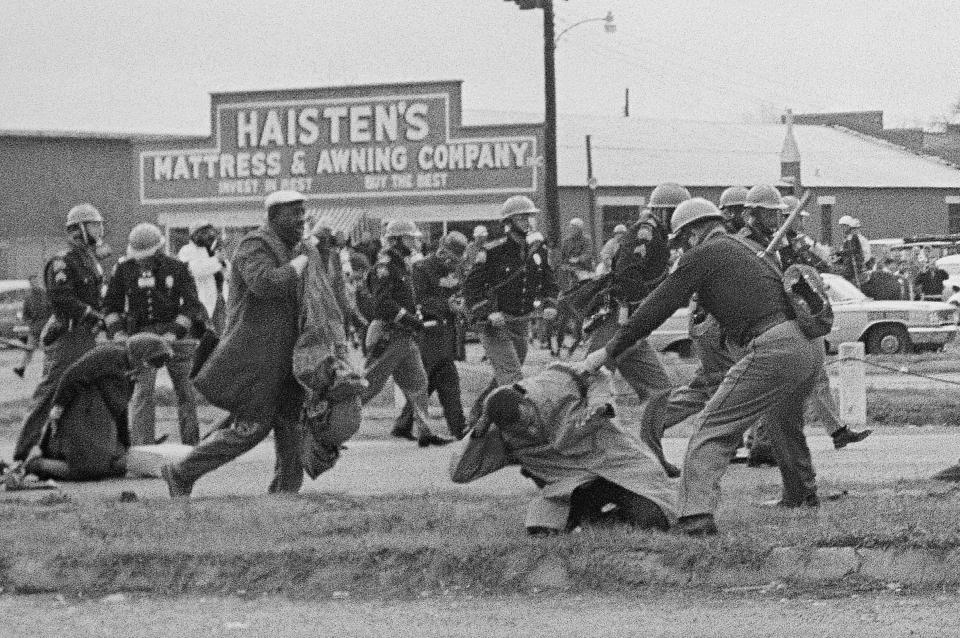Voting rights: Where do the John Lewis Voting Rights Advancement Act and For the People Act stand?
WASHINGTON – During his first address to a joint session of Congress, President Joe Biden put his support behind two pieces of legislation Democrats want to pass to strengthen access to voting and codify certain voter rights.
The For the People Act, also known as H.R. 1, and the John R. Lewis Voting Rights Advancement Act both aim to overturn regulations that make it difficult to vote –especially for people of color – but have taken different paths through Congress.
The For the People Act is in the spotlight as it heads toward a potential fight in the Senate, while the John Lewis Voting Rights Act has not yet made it through the House. Democrats would need at least 10 Republican senators to get on board with either piece of legislation to prevent a filibuster.
The bills are especially relevant as several states have enacted new legislation that civil rights groups fear could suppress the vote for marginalized groups and make it harder to vote overall.
Here is what's in each bill, how Democrats hope they will boost voting rights, and where they stand in Congress.
Voting rights: First Jim Crow. Now SB 202. In Georgia, voter suppression has always been a concern for Black voters

For the People Act
H.R. 1, which passed the House in March, aims to protect voters' rights, strengthen election security, mandate independent redistricting and more.
It includes provisions that would increase voter access by expanding early voting, allowing for same-day voter registration, enacting automatic registration for federal elections and lowering identification requirements. States would also be required to have electronic voter registration, as well as to register eligible felons after they’ve completed their sentences.
The bill would also restrict purges of voter rolls by states that civil rights groups say disproportionately affect minority and low-income residents, and improve voter rights protections that they say were eroded by a 2013 Supreme Court decision.
The decision, Shelby County v. Holder, threw out a section of the 1965 Voting Rights Act that required states and other jurisdictions with a history of voter discrimination to obtain “preclearance” from federal officials before making election changes.
What's in the For the People Act?: The House passed a sweeping voting rights act.
A fight: 'Shame, shame, shame': Schumer, McConnell clash in hearing on major voting rights bill
An issue important to Democrats, in particular, as the 2020 census shakes up congressional districts, is removing partisan control from the redistricting process. The bill requires that states establish an independent, bipartisan commission to draw their congressional districts every 10 years; currently, several states allow the party in control to decide redistricting.
Last month, the Census Bureau released apportionment data that showed some red states like Florida and Texas gaining districts, with some blue states like California and Illinois losing one each. That could have an impact on whether Republicans can flip the House in the 2022 midterm elections, because without independent redistricting processes, states solidly in either Republican or Democratic control have the power to influence how those districts are made up, according to Michael Li, senior counsel for the nonpartisan Brennan Center for Justice’s Democracy Program.
“In some of the states... like Texas, Florida and North Carolina, redistricting is controlled by one party, it gives them a huge advantage because they can aggressively draw the map however they want,” Li said. “Aggressive gerrymandering could give Republicans a House majority in 2022.”

John Lewis Voting Rights Advancement Act
The voting rights bill renamed for the late civil rights icon Rep. John Lewis aims to restore provisions of the 1965 Voting Rights Act that were gutted by the Supreme Court in 2013.
It seeks to bring back the preclearance formula that would require jurisdictions with a history of voter suppression of minorities to obtain preapproval from the Justice Department or federal courts before making changes to election processes.
Related: Voting Rights Act was John Lewis' life's work. 55 years later, minority voter suppression remains
The Supreme Court struck down that part of the Voting Rights Act because it said the formula to determine which jurisdictions needed preclearance was outdated; it did not rule that the requirement itself was unconstitutional.
The John Lewis VRAA is an attempt by lawmakers to find a formula for preclearance that would survive an even more conservative court than the one that struck it down the last time.
Where do they stand?
The For the People Act passed the House 220-210, with one Democrat joining all voting Republicans to oppose the bill earlier this year. Two Republicans did not vote.
Its path through the Senate is anything but clear. It has no Republican backers, but would need at least 10 to join all Democrats to pass. Even Democratic Sen. Joe Manchin of West Virginia has not thrown his support behind what would surely be a partisan vote.
The Senate Rules Committee has held two hearings on the bill, the most recent on Tuesday. There were bold statements on each side of the political aisle and little agreement.
There aren't any Republican senators on board with the For the People Act.
At a Senate hearing on the bill in March, Sen. Roy Blunt, R-Mo., said the legislation would be a "federal takeover of the election process" and "that would be an unmitigated disaster for our democracy."
Meanwhile, the John Lewis VRAA has yet to be taken up in the House, and Politico reported that the chamber may not do so until September, as the House holds hearings in an attempt to build up a case to defend it against legal challenges.
On this year's anniversary of the 1965 "Bloody Sunday" protest in Selma, Alabama, where Lewis was injured, Biden signed an executive order aimed at making voter information and registration more accessible. He's been urging lawmakers to push through both pieces of legislation, as Republicans argue they would unfairly favor Democrats and make it harder to verify voter eligibility.
"The country supports it. Congress should act," Biden said of the legislation during his address to Congress last month.
This article originally appeared on USA TODAY: Voting rights: Biden wants 2 bills passed. Where do they stand?

